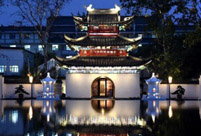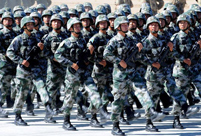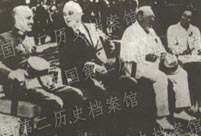 YOG kicks off in Nanjing
YOG kicks off in Nanjing
 Colorful life at Youth Olympic Village of Nanjing 2014 YOG
Colorful life at Youth Olympic Village of Nanjing 2014 YOG
 Royal Taoist temple to open to public
Royal Taoist temple to open to public
 Female soldiers at quake-hit area
Female soldiers at quake-hit area
 Shocking photos of cruel battles in Ukraine
Shocking photos of cruel battles in Ukraine
 Amphibious armored vehicle unit conducts open sea drill
Amphibious armored vehicle unit conducts open sea drill
 Water relay in Henan
Water relay in Henan
 Ethnic culture feasts eyes of travelers
Ethnic culture feasts eyes of travelers
 80 security dogs assembled in Nanjing police dog training base
80 security dogs assembled in Nanjing police dog training base
 Graffiti artists paint on street walls in Xinjiang
Graffiti artists paint on street walls in Xinjiang
Vietnam's Communist Party Politburo's Le Hong Anh arrived in Beijing Tuesday for a two-day visit, as a special envoy of the Secretary General of the Communist Party of Vietnam Nguyen Phu Trong. Several analysts hold that Anh's China trip is aimed at easing the tensions between the two countries. Vietnamese Foreign Ministry spokesman Le Hai Binh said on Monday that Vietnam regrets the damage to foreign-invested companies and the deaths and injuries of Chinese workers in the riots during May and that it has made compensation to affected companies and intends to provide more.
However, Vietnam is not a country that always walks the talk, so we have to wait to see its deeds.
Vietnam is a highly diversified country among China's neighbors. And now it is difficult to say which nation displays more interest in developing the bilateral ties. With a brewing territorial dispute, the two neighbors have suffered several battles since China adopted the policy of reform and opening up in 1978. Similar political systems facilitate the two sides to communicate with each other but play a quite limited role in eliminating the differences.
Both China and Vietnam have advantages in this simmering row. Beijing has a strategic edge and a powerful resolve, while Hanoi has a geographical advantage as it is located nearer to the South China Sea.
Furthermore, China's policy must remain consistent with its global strategic interests.
Plus, the US' "pivot to Asia" strategy provides Vietnam with an opportunity to involve the greatest power in the contention. Although Washington and Hanoi are not military allies, they can still support each other to gain benefit.
Meanwhile, Japan and the Philippines have also been stirring up provocations in the South China Sea. All these elements have endowed Hanoi with capital to contend with China.
It should be noted that this is a normal state of the South China Sea but Beijing will be the deciding force once the Sino-Vietnamese contradiction flares up. China is capable of temporarily laying aside other strategic endeavors to concentrate on dealing with any provocateur in its periphery. This circumstance, once happening, will incur more losses to Hanoi than to Beijing.
Vietnam lacks the impetus to improve relations with China. This also explains why Hanoi is rather to play Taichi with China. As socialist nations, both of them have borne political pressure from the West.
Whether the incumbent Vietnamese government expects to mend fences with China is up to its domestic political stability.
A fundamental solution to the intractable issue between China and Vietnam calls for a favorable regional environment. Beijing can't afford to allow the bilateral conundrum to drag on.
We must learn to care for the interests in different directions and adopt a positive and staunch attitude toward this issue. We should let Vietnam realize that siding with Washington to contain Beijing will cost it more than taking a China-friendly policy as a national strategy.
 Special holidays
Special holidays World's top 10 fighters
World's top 10 fighters 'Stewardesses' serve in hospital
'Stewardesses' serve in hospital Beautiful night scenery of Nanjing
Beautiful night scenery of Nanjing ‘Peace Mission -2014’ joint anti-terror military exercise kicks off in China
‘Peace Mission -2014’ joint anti-terror military exercise kicks off in China Eye-catching guides at the opening ceremony of YOG in Nanjing
Eye-catching guides at the opening ceremony of YOG in Nanjing A female missile launch company of PLA
A female missile launch company of PLA China, the U.S., Britain and the Soviet Union call for Japan's unconditional surrender
China, the U.S., Britain and the Soviet Union call for Japan's unconditional surrender The biggest duty-free store of the world
The biggest duty-free store of the world Volunteers bid farewell to YOG
Volunteers bid farewell to YOG More police dogs join anti-terror campaign in Inner Mongolia
More police dogs join anti-terror campaign in Inner Mongolia Picturesque Dayilan Manchu village in NE China
Picturesque Dayilan Manchu village in NE China Athletes experience the charm of Chinese traditional opera in Nanjing
Athletes experience the charm of Chinese traditional opera in Nanjing Contestants for Miss Bikini World experience Chinese traditional culture
Contestants for Miss Bikini World experience Chinese traditional cultureDay|Week|Month